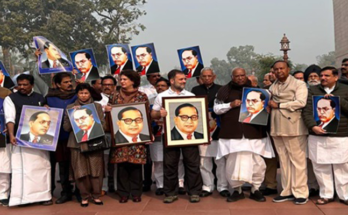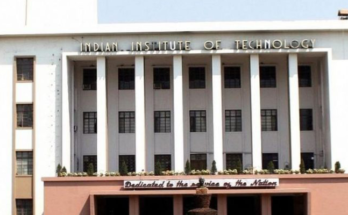Ajay Kumar I Lucknow
The BJP has always advocated for the implementation of the Uniform Civil Code (UCC) in the country, and this issue has been part of the party’s agenda since the time of the Janata Sangh. Since the Bharatiya Janata Party came to power, the party has consistently emphasized this issue. The BJP included issues like the Ram Mandir, the abrogation of Article 370, and the Uniform Civil Code in its political agenda. The dream of Ram Mandir has been realized, Article 370 has been revoked, and now the only task left is to implement the Uniform Civil Code, which is seen as an important challenge for both the BJP and the Modi government.
The Supreme Court cleared the way for the construction of Ram Mandir in Ayodhya, and the Modi government abrogated Article 370 through Parliament. Additionally, steps were taken in Parliament towards “One Nation, One Election.” Now, the BJP has devised a new strategy regarding the implementation of the Uniform Civil Code. The party is working on advancing this issue through state assemblies rather than Parliament. Union Home Minister Amit Shah had hinted at this during his statement in the Rajya Sabha.
While discussing the Constitution in the Rajya Sabha, Amit Shah clarified the importance of the Uniform Civil Code. He said that Article 44 of our Constitution talks about the Uniform Civil Code, but it has not yet been implemented in the country. He blamed the Congress for this, stating that India’s first Prime Minister Jawaharlal Nehru had implemented Muslim Personal Law, and Congress started politics of appeasement. Amit Shah also mentioned that the Supreme Court has repeatedly suggested the implementation of the Uniform Civil Code, but Congress has always delayed it. He gave the example of Uttarakhand, where the BJP government implemented the UCC, and said that the same model would be followed in other BJP-ruled states.
The Uniform Civil Code means that there should be a single law for all citizens in the country. Its objective is to apply the same law for marriage, divorce, property division, and other important issues for every citizen. Currently, under Muslim Personal Law, members of the Muslim community resolve their family matters, but with the implementation of the Uniform Civil Code, there will be a uniform law for all communities. The BJP raised this issue during the time of Janata Sangh, and the party believes that it is necessary for ensuring the secularism and equality of the country.
Prime Minister Narendra Modi has also expressed his views on this issue several times. During a discussion on the Constitution, he spoke about the constitutional importance of a secular civil code and hinted that the government is working towards implementing the Uniform Civil Code. On Independence Day, he also stated from the Red Fort that laws dividing the country on the basis of religion should be abolished. According to him, the country needs a secular civil code, and there is no place for outdated laws in modern society.
In this context, Amit Shah talked about implementing the Uniform Civil Code in other BJP-ruled states based on the model of Uttarakhand. He clarified that the BJP will move forward with the implementation of the UCC through state assemblies in BJP-ruled states. Under this strategy, the BJP has already implemented the UCC in Uttarakhand, and now it plans to implement it in other BJP-ruled states. During the assembly elections, the BJP had promised to implement the UCC in Uttarakhand, and after forming the government, Chief Minister Pushkar Dhami fulfilled this promise. A five-member committee was formed in Uttarakhand, which made recommendations for the UCC, and based on those recommendations, the Uniform Civil Code was implemented in the state.
After Uttarakhand, the BJP government in Assam is also preparing to implement the Uniform Civil Code. Assam Chief Minister Himanta Biswa Sarma recently made this announcement. States like Rajasthan and Gujarat are also in favor of implementing the UCC, and steps are being taken in this direction under their plans. In these states, the BJP could succeed in implementing the UCC in its ruled areas, thereby presenting a model of implementing the Uniform Civil Code across a significant part of the country.
This strategy is important for the BJP because it allows the party to implement the UCC not only in its ruled states but also exert political pressure on opposition parties. The BJP has governments in states like UP, Haryana, Madhya Pradesh, Chhattisgarh, Rajasthan, Assam, Goa, Gujarat, Odisha, Tripura, Manipur, Maharashtra, and Arunachal Pradesh. Goa already has the UCC in place, and Uttarakhand has also implemented it. If the BJP succeeds in implementing the Uniform Civil Code in these states, it could set an example for the entire country.
However, there are some challenges in this process. Many NDA allies, such as JD(U) and TDP, do not support the BJP on this issue. Additionally, the BJP would need a two-thirds majority in Parliament to pass the UCC bill, which currently seems difficult. Due to the political necessity of Muslim votes, JD(U) and TDP cannot support the BJP on this issue. Therefore, the BJP has decided to take the route of state assemblies rather than Parliament to pave the way for implementing the UCC in the states.
Through this strategy, the BJP will attempt to implement the UCC in its ruled states first, and then pressure will be exerted to implement it in other states. This could be a significant political achievement for the BJP as it could help the party realize its agenda of secularism and equality. Moreover, the BJP could involve its allied parties in this issue to gain political advantage.
The BJP governments will have the opportunity to set an example by implementing the Uniform Civil Code in their states. If it is successfully implemented in these states, it will signal an effective change at the national level, and the BJP could then motivate other states to follow suit. Thus, the issue of the Uniform Civil Code is not only an important political agenda for the BJP but could also be a crucial step towards secularism and equality in the country.
If the process is successful in BJP-ruled states, pressure could mount on opposition parties, especially those concerned about the Muslim vote bank. The BJP could present its ruled states as a model, proving that the Uniform Civil Code is in the interest of all communities and helps bring about equality in society. This could force its allied and opposition parties to support the issue, opening the path to implement it at the national level. In this way, the BJP could take effective steps to implement the Uniform Civil Code in the country, ultimately helping move the nation towards a more equal and secular society.




